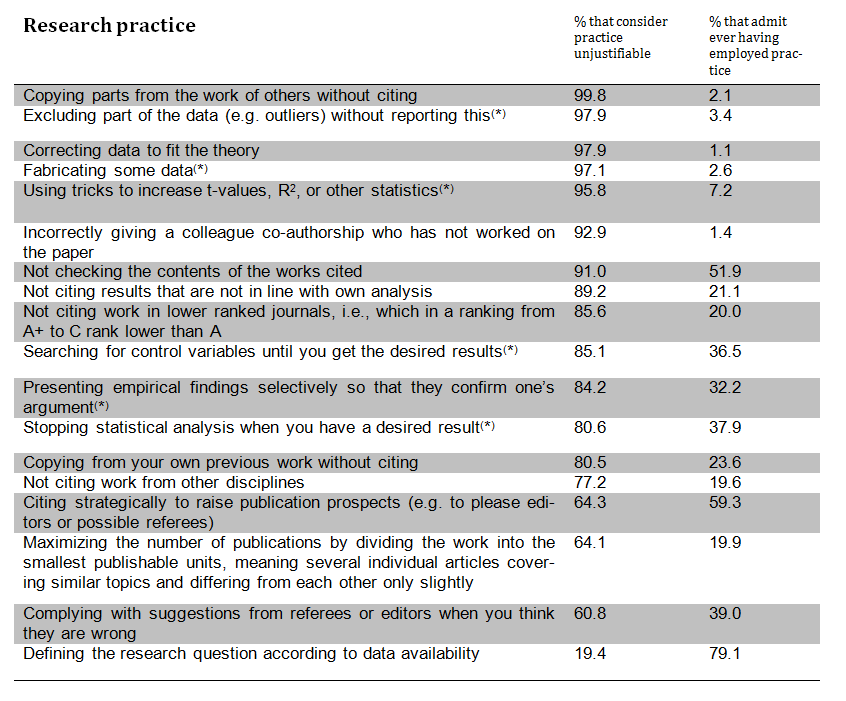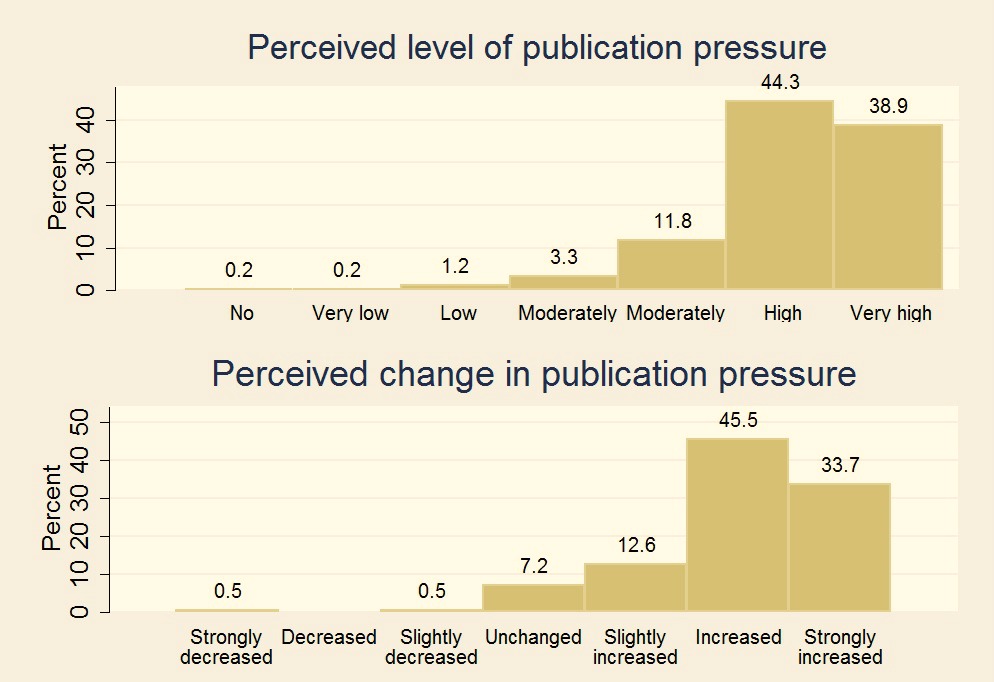by Sarah Necker
Econintersect Editor’s note: This distressing research result is based on a survey of 420 economists who are not identified by the researcher. If those responding to the survey had thought their names would be made public undoubtedly the results would have changed. Anonymity was probably essential to get honest responses. Even so, the author suggests that these results “are likely to present a lower bound estimate“. In her published research she found that 94% of respondents admitted to “engaging in at least one unaccepted research practice“, and up to 60% have employed “questionable research practices“. These results indicate that for many economists the ‘need to be heard‘ is more important than the ‘need to be correct‘. In some cases where ego is involved, it may be the the need to be ‘right’ overpowers the need to be ‘correct’. It appears that the desire for recognition is depriving the profession of the opportunity for discovery.
Click for larger image at source.
Upholding research integrity depends on our ability to understand the extent of misconduct. Fabrication, falsification and plagiarism are widely considered to be unjustifiable, but misbehaviour is still prevalent. For example, 1-3% of economists surveyed admit that they have accepted or offered gifts, money, or sex in exchange for co-authorship, data, or promotion. Economists’ perceived pressure to publish is found to be positively related to their admission of being involved in several rejected research practices.
Science is the endeavor to gain a deeper understanding of how the world works. Trust in scientific research is grounded on the assumption that the researchers report their work honestly and accurately. The results are expected to be unbiased by the researchers’ presumptions or strategic behavior. Experiments in the social sciences in which the researcher acted on behalf of each participant strongly mislead scientific progress. Cherry-picking of findings that conform to a desired hypothesis may be interpreted as the “quest for positive results” but not exactly as the “quest for truth.”
While certain practices clearly represent scientific misbehavior, the justifiability of others is less obvious. What is the bottom line of acceptable behavior? How prevalent are rejected practices? An anonymous online survey among the members of the European Economic Association yields evidence for economics. It is the first study of economists’ research norms and their engagement in a variety of research practices.

Image credit: Schurz Corruption (Wikimedia, Public Domain)
The good news is that surveyed economists almost unanimously reject the fabrication or falsification of research as well as plagiarism. That is not to say that these practices are absent in economics. Cardinal sins such as the correction, fabrication or partial exclusion of data or the copying of another person’s work are confessed by 1-3.5%. Remarkably, 1-3% admit that in exchange for co-authorship, data, or promotion, they have accepted or offered gifts, money, or sex.
Several research practices are often considered “questionable.” Economists’ widespread rejection of the methods indicates that they definitely also represent scientific misbehavior. Economists seem to be aware that such practices can be as damaging to scientific progress as outright fraud. What is worrying is that – in conflict with economists’ convictions – their use seems to be the rule rather than the exception.
Almost every economist reports having engaged in at least one practice considered unacceptable by peers. For example, one third of the participants admit to having cherry-picked results – the selective presentation of empirical results that confirm one’s argument is rejected by 84%. Even though 64% consider it unacceptable to divide one’s work into small units to maximize the number of publications, 20% confess salami slicing. Strategic behavior in the publication process is considered unjustifiable by two thirds. However, 39% admit that they have taken into account suggestions of referees or editors even though they thought that they were wrong. Even 60% report that they have cited strategically to raise publication prospects.
 Note: Based on about 420 observations ((*) behavior based on about 350 observations).
Note: Based on about 420 observations ((*) behavior based on about 350 observations).
For many observers of science it is obvious why researchers violate their own standards. Researchers face two alternatives: “publish or perish.” Every researcher learns at a very early stage that in order to make it to a tenured position, one “top of the top”-journal publication is the very least he has to offer. Do you expect tenured professors to have an easy life? Not anymore. To spur researchers also in other career stages, several countries recently introduced new incentive schemes that relate the laboratories’ funds or the researchers’ salary to the publication record.
The survey shows that economists have internalized that publishing is crucial for their academic survival. High or very high publication pressure is reported by 83% of the participants. Ninety percent perceive that the pressure has increased over the last decade. Economists also worry a lot about the funding for their research. Almost half of the respondents perceive high or very high pressure to raise external funds. How do you proceed if you feel urged to be successful and competition for publication space in top-journals is high? Nice results may increase the likelihood to get the paper published. Bowing to referees and editors may help as well.
 Source: Scientific misbehavior in economics (DOI: 10.1016/j.respol.2014.05.002)
Source: Scientific misbehavior in economics (DOI: 10.1016/j.respol.2014.05.002)
In line with that idea, economists’ perceived pressure is found to be positively related to their admission of being involved in several rejected research practices. For example, it is 14 percentage points more likely that an economist perceiving “very high” pressure admits to having cherry-picked results than that an economist perceiving only “moderately high” pressure confesses the deed. Although the results cannot prove causality, they are consistent with the notion that pressure motivates researchers to act dishonestly. In this light, the finding that economists’ belief in norms seems to be unshaken by competitive pressure is not really encouraging.
The importance to deal with serious violations of research integrity has long been recognized. Institutions have been established that handle allegations, e.g., the Ombudsman of the German Research Foundation. In contrast, “questionable practices” have received attention only more recently. Lack of evidence should be an important reason. It is difficult to assess whether the actions represent intentional bias. Stopping the analysis when a desired result has been found can also be the consequence of ambiguity about the most reliable model. A researcher himself may re-interpret his wrongdoing accordingly. Whom would you rather take into custody: a colleague faking data or the one presenting only his favorite results? The survey reveals that even of the observed cases of serious misconduct only one fourth is reported.
Surveying large representative samples of researchers to obtain estimates of scientific misbehavior has become an established approach. The approach allows inquiring into which behavior researchers consider wrong – and whether they have nonetheless engaged in them. Of course the results depend on the researchers’ willingness to report misbehavior. They are likely to present a lower bound estimate.
Awareness that several research practices are not “questionable” but represent scientific misbehavior may be essential to get a grip on them. Further research on the prevalence and determinants of all types of research behavior is thus desirable. Like whistle blowers, researchers who study scientific misbehavior may fear negative consequences from accusing colleagues of misconduct. They also face the same incentives as any other researcher: Do editors publish papers telling them that the contents of their journals may be biased? Apparently at least some do. This should provide ample reason to find out more about misbehavior in the academic universe.
Note: This article gives the views of the author, and not the position of the Impact of Social Science blog, nor of the London School of Economics.
Reposted from the original under a Creative Commons Attribution 3.0 Unported License.
Source:
- Scientific Misbehavior in Economics: Unacceptable research practice linked to perceived pressure to publish. (Sarah Necker, The London School of Economics and Social Science, 23 July 2014)
Other references in this area:
- Scientific misbehavior in economics (Sarah Necker, Research Policy, Volume 43, Issue 10, December 2014, Pages 1747-1759, Evelsier)
- Academic economists behaving badly? A survey on three areas of unethical behavior – Abstract (JA List, CD Bailey, PJ Euzent and TL Martin, Economic Inquiry, Volume 39, Issue 1, pages 162-170, January 2001)







